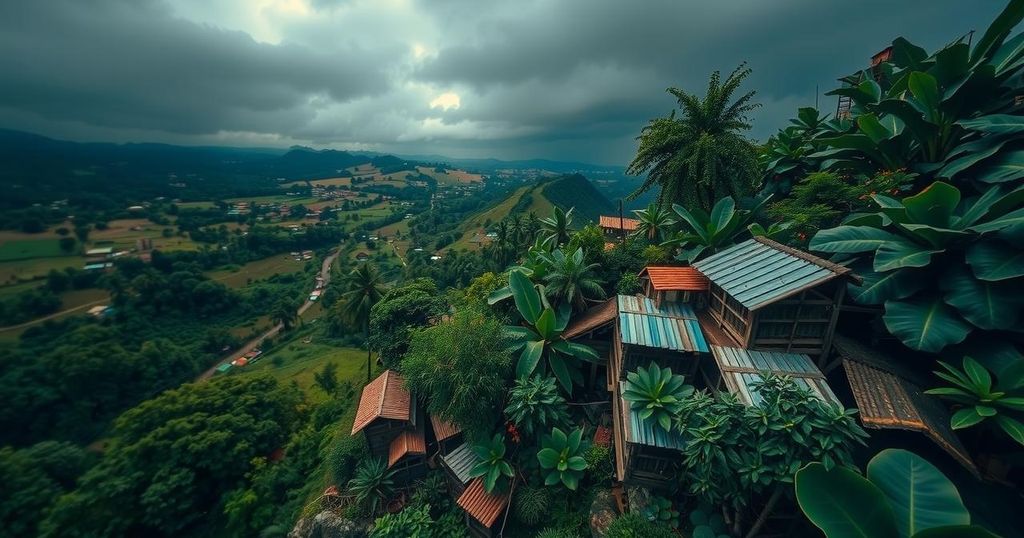The Persistent Crisis in Eastern Democratic Republic of the Congo: A Call for Effective Intervention
The eastern DRC faces a dire humanitarian crisis characterized by persistent violence, notably from groups like the Allied Democratic Forces and M23. The lack of effective international intervention has exacerbated the situation for millions displaced. Traditional international conflict resolution strategies have proven inadequate, revealing a need for a comprehensive rethink of approaches in light of new geopolitical realities and the complexities of ongoing conflicts in the region.
The eastern Democratic Republic of the Congo (DRC) is engulfed in a persistent cycle of violence that continues to devastate civilian lives. On August 10, a brutal attack near Beni claimed the lives of at least 18 individuals, adding to the grim toll from previous massacres in June where 80 and 40 lives were lost, respectively. These atrocities, often attributed to the Allied Democratic Forces—a rebel group with ties to the Islamic State—occur amidst a disturbing pattern of inaction from local and international military forces, including Congolese and Ugandan troops, as well as UN peacekeepers. This lack of intervention reflects a sinister political reality in eastern DRC that has rendered it a perilous landscape for its inhabitants, exacerbated by the international community’s ineffectiveness and indifference. For over three decades, the DRC has faced staggering levels of conflict-induced internal displacement, currently affecting approximately 7 million citizens, according to the International Organization for Migration. Despite the increasing violence and human rights violations, responses from international actors have been slow, reactive, and often misaligned with the complexity of the situation. Particularly since the resurgence of the March 23 Movement (M23), international attention has shifted primarily toward this group, overlooking a multitude of other militia factions likewise wreaking havoc. The DRC government has adopted nationalist rhetoric, urging militias to ally against M23, thereby complicating an already precarious security environment. International partners continue to funnel resources into conflict resolution efforts, yet these strategies are typically superficial and fail to address the underlying political realities. The pitfalls of a historically simplistic understanding of conflict retention persist, with narratives frequently centered around colonial simplifications of resource exploitation and ethnic conflict, rather than acknowledging the multifaceted political dynamics at play. Moreover, responses have been inconsistent and contradictory, notably concerning the military affiliations of neighboring countries such as Rwanda and Burundi, which have further complicated the conflict dynamics. This randomness in international policy has led many in the DRC to question the credibility and efficacy of Western intervention strategies. In light of the shifting geopolitical landscape, new players and models of intervention are emerging, often motivated by self-interest rather than humanitarian goals. Non-Western alliances and private military enterprises are gaining ground, often without any inclination towards promoting human rights or democratic values, thereby perpetuating a cycle of insecurity and suffering. The current situation in eastern DRC necessitates a reevaluation of the approaches taken by international stakeholders, emphasizing the urgent need for comprehensive understanding and innovative diplomacy. As the region grapples with the implications of these geopolitical shifts, a sober examination of the changing nature of conflict and the efficacy of international responses is critical for the future of DRC and its people.
The eastern Democratic Republic of the Congo (DRC) has been plagued by conflict and violence for over three decades, resulting in immense human suffering and a staggering number of internally displaced persons. The region’s turmoil is characterized by the involvement of numerous armed groups, poor governance, and a lack of effective international response, leading to a humanitarian crisis. Recent escalations in violence, particularly attributed to groups like the Allied Democratic Forces and the March 23 Movement (M23), have prompted calls for renewed attention, yet responses have often been muddled and inadequate to address the underlying political and social issues inherent to the DRC’s conflicts.
In conclusion, the eastern DRC stands as a stark reminder of the failures of traditional international peacebuilding efforts in the face of evolving conflict dynamics. The complexities of local and regional tensions necessitate a rigorous reassessment of policy approaches to ensure that interventions are not only well-informed but genuinely effective. As new geopolitical forces emerge, it is imperative that the international community adopts a more nuanced and strategic approach, recognizing the multifaceted nature of the crises affecting eastern DRC. Only through such a paradigm shift can there be hope for alleviating the suffering of its people and fostering a stable and peaceful future.
Original Source: www.aljazeera.com




Post Comment